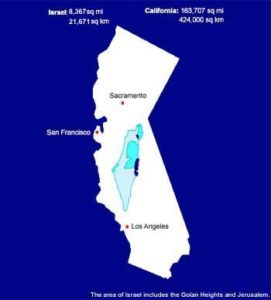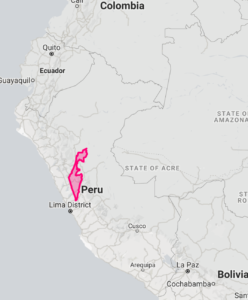Seven Signs You Might Be A Christian Zionist
What do Christian Zionists believe? How might we summarize the core ideas of Christian Zionism?
Although Christian Zionism is global and diverse, millions of Christians could embrace the seven affirmations listed here. Many of these folk are North American evangelicals, but the movement is surging in Africa, Latin America, and parts of Europe, generally wherever Evangelicalism and Pentecostalism have recently taken root and flourished.
One could be a Christian Zionist without affirming every point, but this list of seven describes the most influential branch of the movement over the last century, and might help explain the outlook of some of the most powerful people in the current U.S. administration.
You never know. It might even describe you.
1. The Church does not replace Israel.
Although Jesus’ earliest followers were all Jewish, within a generation or so they were heavily outnumbered by Gentiles. The church has been overwhelmingly Gentile ever since. But that doesn’t mean God is finished with the Jews, nor that the promises God made to Abraham’s literal descendants (Israel) have been transferred to Jesus and his spiritual followers (the church). Christian Zionist Paul Wilkinson wants there to be no confusion:
“The Church is neither the ‘new’, the ‘true’, nor ‘spiritual Israel’.”
Wilkinson, For Zion’s Sake, 17.
Likewise, pastor John Hagee:
“Scripture plainly indicates that the church and national Israel exist side by side, and neither replaces the other—ever!”
Hagee, In Defense, 179.
Thus, if God promised long ago that the children of Israel would dwell safely and perpetually in the promised land, it shall surely come to pass. Literally.
2. All the Land belongs to Israel.
It is hard to overstate the territorial dimension of Christian Zionism. God’s covenant promise that Israel would inherit the land was unconditional. Israel’s disobedience may incur exile from the land but never final dispossession.
Christian Zionists see God’s faithfulness to the ancient Land Promise in the 20th century migration of Jews to the Land, in the establishment in 1948 of the state of Israel, and in the seizure in 1967 of the West Bank (known to Zionists by its biblical name: Judea and Samaria) and East Jerusalem.
Never one for subtlety, Pastor John Hagee declares:
On May 15, 1948, a theological earthquake leveled replacement theology when nation Israel was reborn after nearly two millennia of wandering. . . . Their rebirth was living, prophetic proof that Israel has not been replaced.
In Defense of Israel, 181-182.
Thus, when Jews today settle in Occupied Territories, they are simply claiming land that is already theirs by divine entitlement.1
The corollary to Jewish entitlement is Palestinian non-entitlement.
Many are the opponents of a nation state of Palestine. Some dismiss outright the very category “Palestinian”;2 some contend that early Zionists found the Land virtually empty;3 some contend that an Arab state next door to Israel would be unstable and expansionist.4 A Christian Zionist might agree with these arguments, but her primary opposition to a state of “Palestine” remains that it would mean assigning land to Arabs that God promised to Jews.5
If one were to suggest that Israel’s promise of a Holy Land in the Old Testament may have been fulfilled in Jesus and his Holy Community in the New Testament, Christian Zionists would cry foul. That is spiritualizing what God intended for the literal bloodline of Jacob. Moreover, they would say that the day is coming when tiny Israel (see comparisons below) will not only be secure within her present borders but will expand far beyond them to include all lands God promised Abraham.
3. Israel will build a Third Temple.
At the center of every form of Zionism is the Land of Promise. At the center of the land is Zion, the holy city of Jerusalem. At the center of Jerusalem a Temple once stood, with its concentric circles of holiness: the outer courts, the holy place, the Holy of Holies.
Here’s a brief historical recap: the Babylonians destroyed Solomon’s Temple in 586 BCE. The 2nd Temple was rebuilt under Ezra and Zerubbabel with the blessing of Darius, and dedicated in 516. It was desecrated by Antiochus IV Epiphanes in 167 BCE, rededicated in 164 BCE, and expanded and adorned under Herod and his successors beginning in 19 BCE. Second Temple restorations were completed in 64 CE, a mere half dozen years before the Romans destroyed it in 70!6
We find hope for a 3rd Temple in Jewish traditions in Mishnah (200 CE) and Talmud (c. 600 CE)—a Temple to be built in conjunction with the coming of the Messiah. Generations of religious Jews have prayed:
May it be Thy will that the Temple be speedily rebuilt in our days.
Christian Zionists happily concur: a 3rd Temple will rise where the 1st and 2nd Temples once stood.7
4. We live in the Last Days
As noted, Christian Zionists attach apocalyptic significance to the return of Jews to the Holy Land, to the birth and stunning growth of the state of Israel, and to the capture (“liberation”) of the Temple Mount. Speaking for many Christian Zionists, John Walvoord says:
few events can claim equal significance as far as Biblical prophecy is concerned with that of the return of Israel to their land. It constitutes preparation for the end of the age, the setting for the coming of the Lord for His church, and the fulfillment of Israel’s prophetic destiny.8
Some Christian Zionists have bravely named our generation as the last to arise before Christ’s return; others more modestly contend that the end be near, that no prophecies remain to be fulfilled before the Rapture,9 and that the growing number of Jews eager to rebuild the Temple is a prophetic sign. A global battle is coming with Israel pitted against the nations. Things will get far worse before they get better.
5. The conflict between Arabs and Jews is spiritual, not political
No political pressure, no international diplomacy, no economic incentives, no treaty, no “two-state solution”—no human effort will resolve the Israel-Palestine conflict and create a just and free society for all. We should thus not ask Israel to trade “land for peace” (the U.N. formulation). Indeed, for Americans to pressure Congress, or for the U.S. to pressure Israel, for a political solution only paves the way for the lies, deception and false peace of a coming Antichrist.
Hal Lindsey’s pessimism is shared by many:
When the Jews re-established their nation in Palestine they created an unsolvable problem: they displaced Arabs who had dwelt in Palestine for several centuries. All the legal debates and logical dissertations that can be advanced will never change the basic state of hostility that exists between the Israelis and the Arabs.”10
6. God calls us to bless and support Israel
If you are looking for “Christian Zionism in a nutshell,”11 look no further than Genesis 12:3:
I will bless those who bless you, and the one who curses you I will curse; and in you all the families of the earth shall be blessed. (NRSV)
In Genesis, God makes this promise to Abraham, but it applies to Abraham’s descendants. As Scofield explains in his Reference Bible:
It has invariably fared ill with the people who have persecuted the Jew—well with those who have protected him. The future will still more remarkably prove this principle.12
The corollary is that God blesses America when America supports Israel. Should she ever withdraw that support she will face divine censure (Isa 60:12).13 At the dawn of the Ronald Reagan era, Jerry Falwell spelled this out:
God has blessed America because America has blessed the Jews. If this nation wants her fields to remain white with grain, her scientific achievements to remain notable, and her freedom to remain intact, America must continue to stand with Israel.14
7. Sound interpretation requires a literal reading of Scripture
When Israel’s prophets foretold the end of exile, restoration of monarchy, return of prosperity and resumption of sacrifice (e.g., Isa 66:20; Ezek 37:21-22; 43:18-27; Amos 9:11-14; Mal 3:4), this is exactly what readers should expect: Israel’s restoration will be ethnic and territorial and religious and political (as well as spiritual.15
Literalism
If the plain makes good sense, seek no other sense, or you will learn nosense.
We must consistently apply the plain, normal, literal interpretation.
C. C. Ryrie
These seven claims describe (I hope, fairly) American-style, classic Christian Zionism.
Would you affirm some of them? All of them? Are you a Christian Zionist?
Your feedback is always welcome!
- Horner, Future Israel, 143; Pawson, Defending Christian Zionism, 120-125. On the relationship between Dispensationalists and Christian Zionists on the national future of Israel, see Darrell L. Bock and Craig A. Blaising, both Dispensationalists: “One of the most well-known features of the dispensational tradition is the belief in a future for national Israel. That future includes at least the millennial reign of Christ and for some dispensationalists, extends into the eternal state as well. Because of this strong belief, some early dispensationalists, such as W. E. Blackstone, played a key role in garnering support for the Zionist movement. That has carried forward to present times in the pro-Israeli political activities of Jerry Falwell and Pat Robertson. While not all dispensationalists have strongly supported the modern Zionist movement, still they have traditionally held that prophecies regarding the political, national restoration, and blessing of Israel will be fulfilled in the next dispensation. And while other theologies have also come to the point of according the future of Israel serious consideration, it has often been due to the insistence of dispensationalists who have always made national Israel a prominent feature of their biblical interpretation.” Progressive Dispensationalism (Baker, 2000), 21.
- See Wilkinson, For Zion’s Sake, 41-42.
- Phrases like “a land without a people for a people without a land” go back at least to an 1854 diary entry by ardent Restorationist, Lord Ashley, the 7th Earl of Shaftsbury, on which see D. Lewis, Origins of Christian Zionism, 151-52 and V. Clark, Allies for Armageddon, 71-72. By 1891, Old Testament scholar George Smith was emphasizing the land’s “emptiness” in The Historical Geography of the Holy Land (Armstrong & Son, 1902). Repeating the claim that the Zionists found the Land virtually “empty” was Joan Peters, From Time Immemorial (1984; JKAP, 2001) and Alan Dershowitz, The Case for Israel (Wiley, 2003), 22-28. (Against Peters, see Norman G. Finkelstein, Beyond Chutzpah: On the Misuse of Anti-Semitism and the Abuse of History (2005; updated, UC Press, 2008), 273-298.) On the vitality of Arab society before and during British Mandate Palestine, see Rashid Khalidi, The Iron Cage: The Story of the Palestinian Struggle for Statehood (Beacon, 2006), 1-104; Alan Hart, Zionism: The Real Enemy of the Jews. Vol. One. The False Messiah (Clarity, 2009), 74; and Sandy Tolan, The Lemon Tree: An Arab, a Jew, and the Heart of the Middle East (Bloomsbury, 2007).
- Benny Morris, One State, Two States: Resolving the Israel/Palestine Conflict (Yale, 2009), 193-96.
- Teplinsky, Why Care? 223-224.
- For a Christian Zionist history of the 1st and 2nd Temples and the Jewish hope for a 3rd, see Price, The Coming Last Days Temple, 59-135; Ice and Price, Ready to Rebuild, 39-99.
- Lindsey, Late Great, 51, 55-58, 152; Ice and Price, Ready to Rebuild; Price, Coming Last Days Temple. See Clark, Allies for Armageddon, 276-77.
- Israel in Prophecy, 26 (see pp. 15-26, 115). See Lindsey, Late Great Planet Earth, 50-55.
- Not all Christian Zionist groups advocate a Rapture, though they generally do anticipate a restored Temple. See Merkley, Christian Attitudes, 177.
- Late Great Planet Earth, 151-152, emphasis added. S. Teplinsky, Why Care? 221-24, warns of divine wrath against those who endeavor to “divide the land” by helping establish a Palestinian state. Similarly, Price, The Coming Last Days Temple, 448-49. Non-Christian Zionist Stephen Sizer (Christian Zionism, 252), summarizes his opponents: “To advocate that Israel compromise with Islam or coexist with Palestinians is to identify with those destined to oppose God and Israel in the imminent battle of Armageddon.” See also S. Spector, Evangelicals and Israel, 50-52, 76, 88-95, 109.
- David Brog, Standing with Israel: Why Christians Support the Jewish State (Frontline, 2006), 69, cited by Wilkinson, For Zion’s Sake, 69. Another favorite Christian Zionist verse is Psalm 122:6-7.
- 1909. From footnote 3 at Gen 15:18 but referring explicitly to Gen 12:3. The New Scofield Study Bible (1967) moves the footnote to Gen 12:2, updates the wording, and adds a warning: “For a nation to commit the sin of anti-Semitism brings inevitable judgment.”
- Spector, Evangelicals and Israel, 23, cites Gen 12:3 as “by far the most prominent reason evangelicals cite for their backing of the state of Israel.” Cf. Pawson, Defending Christian Zionism, 150-155; Hagee, In Defense, 95-123.
- Jerry Falwell, Listen, America! (Bantam, 1980), 98, cited in Spector, Evangelicals and Israel, 24. See Wilkinson, For Zion’s Sake, 37-38, for an inventory of Christian Zionist remarks. Also, Clark, Allies for Armageddon, 159-60; Spector, Evangelicals and Israel, 107-109. For a Christian Zionist account of God’s care for Israel through history, see “The Preservation of the Jewish People” by Will Varner in Israel My Glory 60 (3), available online in two parts: www.foi.org/thepreservationofthejewishpeoplepart1.
- Walvoord, Israel in Prophecy, 30. Hal Lindsey: “If you take the Bible literally, then you come up with the premillennial point of view. I hate those who read their ideas into the scripture by using allegory” (cited by Gorenberg, The End of Days, 121).
- Cited in Donald Wagner, “Bible and Sword: US Christian Zionists discover Israel,” (www.informationclearinghouse.info/article4950.htm).
- In Defense, 182. Similarly, Dave Hunt, “O Jerusalem, Jerusalem!” The Berean Call (Sept. 2000), 1, cited by Wilkinson, For Zion’s Sake, 37.









